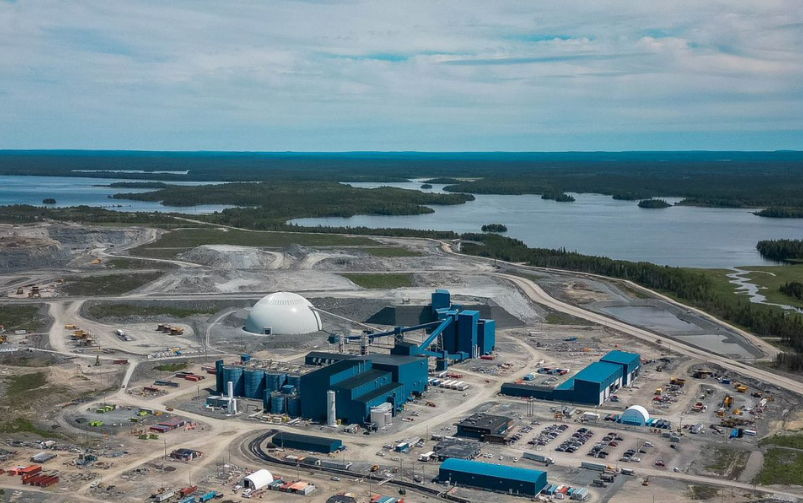The 2024 PDAC conference, held in Toronto this week, included over 1,100 exhibitors from across the mining industry, and drew in 26,926 attendees. Courtesy of PDAC via LinkedIn.
Welcome back to your weekly mining news recap, where we catch you up on some of the news you may have missed. This week’s headlines include SSR Mining’s responsibility to clean up after a leach pad landslide in Turkey, Canada and Australia partnering up to strengthen critical minerals supply chains, and Osisko Development securing funds to advance its Cariboo gold project.
Energy and Natural Resources Minister Jonathan Wilkinson expressed unease about market manipulation and dumping practices of critical minerals, as reported by Reuters. The minister suggested investigating an alternative pricing model to decrease Canada’s reliance on China when it comes to obtaining the key metals needed to advance the energy transition. Wilkinson has suggested that Canada and other Western countries think about implementing tariffs against Indonesia and China as a way to target market manipulation stemming from an oversupply of low-cost nickel. He also announced at the PDAC convention this week that Canada will be allocating $15 million in funding for projects to aid the country’s growth of its critical minerals industry, along with projects to boost Indigenous involvement in mining.
During his opening keynote at PDAC on March 3, Rio Tinto CEO Jakob Stausholm highlighted opportunities for collaboration on decarbonization initiatives in Canada, and added that the company was interested in investing in Canada’s lithium if it finds the right resource. In other PDAC news, mine developer Rock Tech Lithium announced at the convention that it has paired up with BMI Group to develop a lithium conversion plant in the town of Red Rock, which could be Ontario’s first lithium refinery, as reported by Northern Ontario Business. It was also shared by the same outlet that 11 northern Ontario mining supply and service sector companies will split $3.7 million in provincial funding in an effort to increase innovation and job opportunities within the province.
Canada and Australia will work together with the goal of improving transparency within global critical mineral supply chains and will also advocate for the importance of having firm environmental, social and governance standards in place, as reported by Reuters. The countries also plan to collaborate on areas such as R&D and investment. The non-legally binding partnership is being led by Canada’s Natural Resources Ministry and Australia’s Critical Minerals Office and will look into prospects pertaining to the research and development of critical minerals.
Osisko Development is working on securing funding for its Cariboo underground gold project in B.C. and has entered into a credit agreement with the National Bank of Canada for a delayed draw term loan of $67.8 million, as reported by Canadian Mining Journal. The loan will be used to support detailed engineering and pre-construction tasks at the Cariboo project.
BHP has signed non-binding sales agreements for all potash production from both phases of its Jansen mine in Saskatchewan, which will begin production sometime in 2026, as reported by Reuters. The company is seeking to convert these preliminary agreements into firm offtakes over the next 12 to 18 months.
Frontier Lithium and Mitsubishi will partner up to undertake a joint venture to construct Frontier’s PAK lithium project in Ontario, a proposed US$576 million fully integrated mine, along with a lithium chemicals conversion refinery, as reported by Northern Ontario Business. Mitsubishi will gain a 7.5 per cent stake in the project valued at $25 million, with the option to increase its stake to 25 per cent in the future. The refinery construction is planned to start in mid-2027, with lithium chemical production expected to start in 2029.
Chinese firm Jiangxi Copper recently purchased an additional $287.5 million worth of shares in First Quantum Minerals, as reported by Bloomberg. This purchase comes following the Panamanian government forcing a shutdown of First Quantum’s Cobre Panama copper mine late last year, a major blow to First Quantum as the mine accounted for 78 per cent of its operating profit in the first nine months of 2023. Jiangxi currently holds an 18.4 per cent stake in First Quantum. Panama’s Trade and Industry Minister Jorge Rivera recently shared that closing Cobre Panama will cost around US$800 million, as reported by Reuters.
SSR Mining’s Turkish unit is being expected to cover all costs associated with cleanup after a catastrophic leach pad landslide at its Çöpler gold mine on Feb. 13, as reported by Bloomberg. The cleanup efforts include the removal of more than 9 million tonnes of waste soil. The search for nine missing workers is reportedly still under way.
A recent seminar hosted by Fasken on Feb. 29 zoned in on how mining companies can improve relations with Indigenous communities around the world. Panelists explored the importance of effective engagement between mining companies and Indigenous community rights holders, and discussed how thoughtful engagement can lead to a deeper understanding of Indigenous traditions and knowledge and can promote healthier relations between mining companies and communities.
As mental health continues to be an area of concern in the mining industry, more companies are seeking to address the issue by introducing mental health training programs into the workplace, as reported by Mackenzie Patterson in the February issue of CIM Magazine. Advocates say that these programs could help workers better understand mental illness, along with how to provide support to those who may be dealing with mental health concerns.
That’s all for this week. If you’ve got feedback, you can always reach us at editor@cim.org. If you’ve got something to add, why not join the conversation on our Facebook, Twitter, LinkedIn or Instagram pages?




